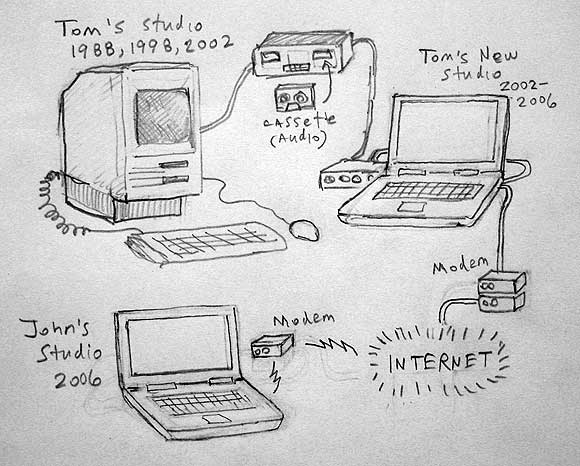View current page
...more recent posts
Let's watch George Felix Allen insult the opposition's cameraman again. [YouTube] Although intrepid bloggers were quick to define "macaca" as a North African insult, I think Allen was probably telling the truth that he just made up the word on the spot. What's disgusting is the "...or whatever your name is" that follows it, and Allen's smugly superior delivery. This was a genuine blunder, as a huge part of his constituency was from ethnically diverse Northern Virginia. Thanks to YouTube and the Net community, everyone could see this a*hole for what he really is. It's great he lost his campaign for Senator.
Regarding the elections:
So, America came to its senses 6 years late.
All it took was untold carnage in foreign wars, the loss of a major city, the hemorraghing of the Treasury to epic corruption, and mounting fear of religious nuts making people's personal and family decisions.
Some of us have been saying the leadership was bad since '00. But it's great folks finally came around.
It would have been ideal if the traitor Lieberman had gone down in Connecticut. But as has been pointed out, the money the Republicans (hello, the opposition party?) spent to save his hash probably cost them the Senate. Also, the Lamont primary win gave people hope that these bastards could be beaten.
Clearly the internet and bloggers had a major role in this seismic shift. I believe they'll continue to act as a corrective to corrupt government and media complicity with same.
Who knew all these people existed around the country whose talents the system wasn't recognizing?
"Kay Whole Again" [mp3 removed]
Update: extended the length about 30 seconds, made minor edits throughout. The idea here was to explore one e-drum sample kit--adding pitch to some of the drums and seeing what happened with a tempo change. The Sidstation parts added for melodic interest kind of took over, as usual. I wrote the rhythms using overlayed fragments from a MIDI demo track.
Update 2: I added a bass line (d'oh, I always forget those) and some other changes to make it more "house-y."

"Streetsong (Beat Up Remix)" [6.1 MB .mp3]
John Parker's mix of my Mac SE tune "Streetsong," and my mix of his mix. Incorporating a famous drum lock groove.
The chart doesn't really apply to this song, because there's very little Mac SE in it. But it describes the working method for most of the other tunes we're doing.
Via attaturk, posting on the Eschaton blog:
And now a special message from the Republican National Committee:Re: the election generally: yay us, boo them. Now that we're getting the idea that the netroots works better than Rove's fear machine, we need to keep pressure and sunlight on these bastards as they inevitably get all clubby again with crooks and munitions lobbyists on the cocktail circuit of that stupid hick town DC (apologies to friends and loved ones there for the crack).
Attention Montana Election Officials:
Cheney is nearby and he's armed.
Just something to think about.
Update: Montana now has a Democratic Senator. Still waiting to find out whether Virginia will reject its current racist and sadist--sounds like it will be a while.
At the blog of new media artist duo MTAA you can listen to an .mp3 file of artist Marisa Olson "kicking the ass" of MTAA-er T.Whid (as he phrases it). This is the eighth and next-to-last in a series of MTAA's "live at the art opening" online field recordings. It's very entertaining and informative.
In the recording, Olson, who also blogs and makes new media art, coolly, efficiently, and amusingly dispatches T.Whid's leading questions such as:
--Is the 8 Bit movement evolving, since Cory Arcangel is the leader of the movement and his most recent show contained nothing 8 Bit in it?
--Is it a problem that artwork requiring specialized knowledge to appreciate (i.e., Net Art) is on the Web where anyone can consume it in a mass media way?
--Is Net Art devolving into something that can be judged very easily and quickly and rated according to its hit count?
--Isn't it getting harder and harder for Net artists to work in the context of the other Web culture (i.e., popular, amateur) that is steadily growing?
(The above are my paraphrases of the questions. I believe the drift is accurate.)
Update: I characterized the questions as "leading" (stating arguments rather than open-endedly eliciting information) but they are actually more in the nature of "when did you stop beating your wife?" questions (containing more than one assumption the questionee is being asked to assent to or not). Here, for example, are all the assumptions packed into the first query: (a) that an 8-bit art movement exists; (b) that it has a leader; (c) that Cory Arcangel is the leader; and (d) that his switch from hacking Nintendo cartridges to a computer-assisted critique of films, TV, and pop music necessarily constitutes evolution. For what it's worth my answers to T.Whid's questions would be Yes, No, No, and No.

Thor Johnson, photo of Christian Wrestling Federation event in Rockwall County, Texas (near Dallas). More photos documenting the match. One funny thing about Johnson's photos is he seems to be invisible. He is obviously all over the room, yet none of the locals are reacting to his presence. You'd think they'd have better radar for Satanic, I mean, sardonic intent.
My collaboration with John Parker, documented here, is continuing. We are working on a CD of his remixes/mashups of chiptune songs I wrote (some during the '80s).
The original tunes were somewhat out of step with the "8 Bit movement" we've been discussing lately. The Mac SE I used included a four-voice, 8-bit sound chip but it wasn't one of the game computers such as the Atari or the Commodore. But it is digital signal processing and I was conscious at the time of using the chip "to the limit" of the sound it was capable of. A piece called "Monster Scales" (written around '98) is a four note chord that goes up and down the scale from the lowest note the machine could play to the highest. The chip couldn't "keep up" with the requirement to produce pure tones so you got rhythmic "artifacts" that lagged behind the sound. These were quite beautiful--like gamelan or thumb piano plinks.
John's remix takes advantage of the time stretching features of Ableton (basically a DJ or live mix tool--with sequencing functions) to slow down and speed up the already fragmented scales. Tones and artifacts alike are heightened and "drawn out" during this process--slowing it down, say, makes audible many textures you couldn't otherwise hear.
I'll be plugging the CD more here as it gets finalized: it's not some damn cult of nostalgia, nor a paean to "state of the art" digital consumer products, but rather a present-tense hybrid of the unique sound textures made by older gear and skeptical types of things you can do with current instruments. Plus it's fun.
